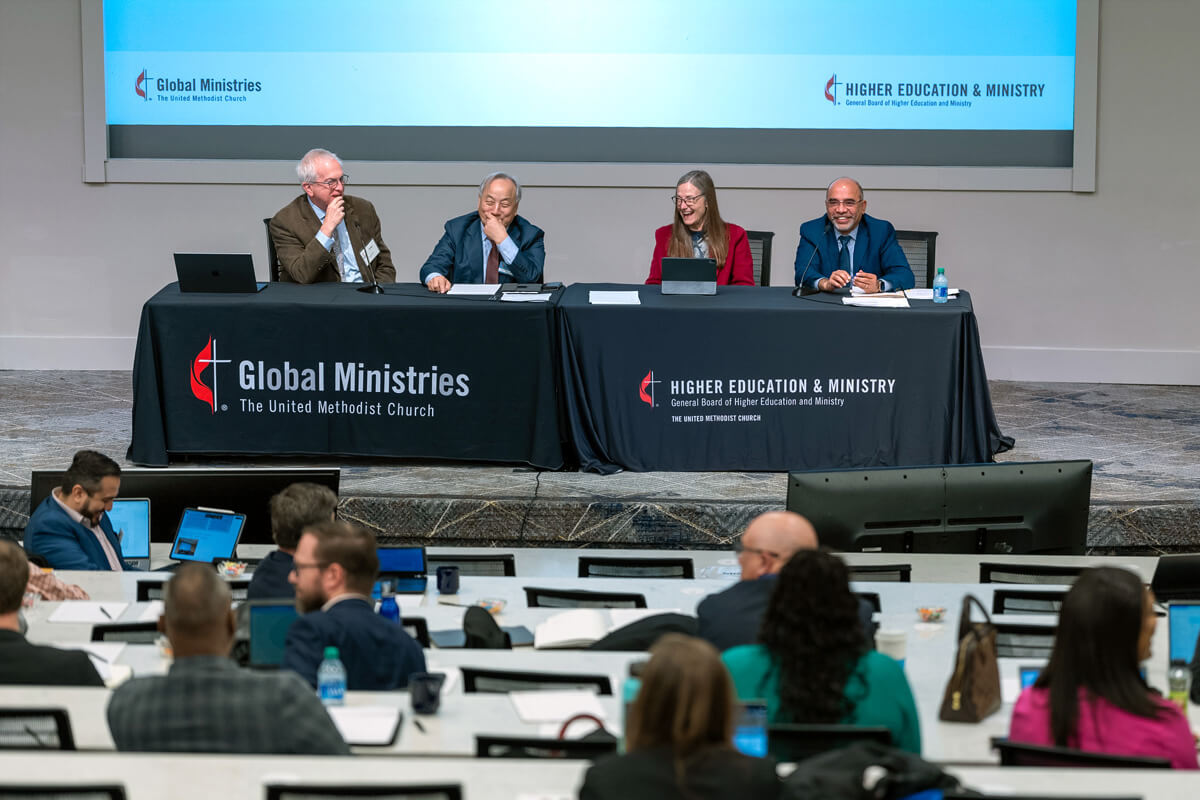Pontos Chave:
- As primeiras reuniões conjuntas das Juntas dos Ministérios Globais da e do Ensino Superior e Ministério da Metodista Unida tiveram lugar de 4 a 8 de Março em Atlanta.
- A partir de 1 de Julho, ambas as juntas estarão sob a tutela de Roland Fernandes após a aposentadoria do Rev. Greg Bergquist, alto executivo do Ensino Superior e Ministério.
- Os planos apelam a uma colaboração mais equitativa com os constituintes que necessitam de ajuda, para superar as atitudes colonialistas.
Trabalhando sob o manto de grandes e iminentes cortes orçamentais, as juntas da Metodista Unida que apoiam o desenvolvimento de liderança e o trabalho missionário usaram a sua primeira reunião conjunta para oferecer uma visão igualitária das relações entre si e com os seus constituintes.
“Temos de lidar com as realidades que enfrentamos e fazer o melhor que podemos,” disse Roland Fernandes, executivo superior da Junta Global dos Ministérios da Metodista Unida e do Comité Metodista Unido de Ajuda. “Estou optimista, embora seja difícil.”
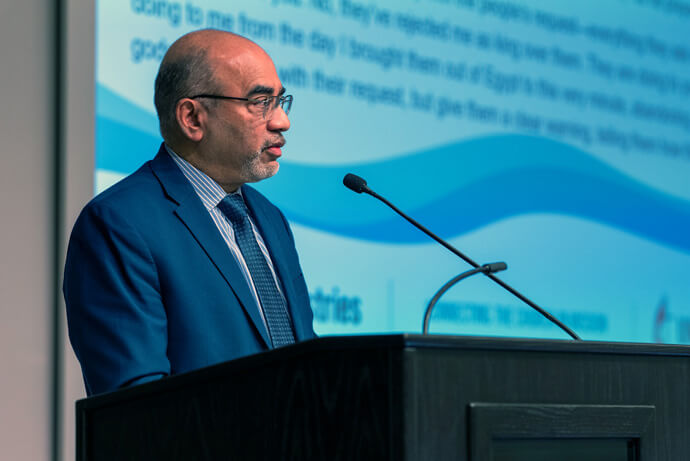
No dia 1 de Julho, Fernandes acrescentará às suas responsabilidades a supervisão da Junta do Ensino Superior e Ministério da Metodista Unida. É quando o principal executivo do Ensino Superior, o Rev. Greg Bergquist, deverá se aposentar.
As juntas não estão se fundindo, todos os envolvidos foram rápidos em dizer.
“Em eventos como este, parece que estamos muito perto de (uma fusão),” disse Fernandes numa entrevista no final das reuniões de 4 a 8 de Março. “Quando realmente entras nos detalhes e olha para isso, não é tanto, porque há muitas diferenças nas nossas agências. … Definitivamente não é algo que poderíamos facilmente dizer que podemos seguir em frente e fundir.
“É muito importante manter ambos separados neste momento.”
Instando uma resposta mais forte no Médio Oriente
A resposta da Igreja Metodista Unida às hostilidades no Médio Oriente foi caracterizada como “muito fraca e tímida” durante a reunião conjunta das juntas dos Ministérios Globais e do Ensino Superior e Ministérios da Metodista Unida.
“Os nossos corações estão partidos pelo sofrimento que tem ocorrido em Israel e na Palestina desde Outubro,” disse Roland Fernandes, executivo superior dos Ministérios Globais e da Comissão Metodista Unido de Ajuda. “Ao olharmos atentamente para o que está a acontecer em Gaza, em particular, o termo ‘genocídio’ deveria ser um descritor que utilizamos.
“As respostas da Igreja, especialmente da IMU, têm sido muito fracas e tímidas. Encorajamos todos aqueles que ocupam posições de autoridade a estabelecerem um cessar-fogo imediato para que aqueles que estão famintos possam ser alimentados. Como organização humanitária Cristã, pedimos que as organizações humanitárias tenham acesso total, imediato e seguro a Gaza.”
Um memorando de entendimento sobre o novo relacionamento foi assinado em 6 de Março por funcionários dos Ministérios Globais e do Ensino Superior e Ministério disse Bergquist.
“Em conversas com as comissões executivas, o conselho de administração apoia todos os nossos funcionários para reivindicar este processo de alinhamento como sua meta número um para este ano,” disse Bergquist.
“Isto não só nos vai ajudar a continuar a impulsionar os nossos ministérios normais,” acrescentou. “Isto vai ajudar-nos a concentrar-nos nesta união de formas novas e poderosas que acreditamos… que irão gerar o tipo de missão e visão… e estratégia que nos impulsionará para a próxima quadrienal que realmente fará a diferença.”
A reunião no Emory Conference Center Hotel incluiu 32 directores de Ministérios Globais, 10 da Junta de Ensino Superior e Ministério e um de cada um deles participando remotamente através do Zoom. Durante todo o processo, houve uma ênfase em deixar para trás os estilos de gestão de cima para baixo.
“As nossas agências gerais têm muitas vezes presumido ser o centro de qualquer actividade que fomos incumbidos de apoiar, quer seja missão, educação ou qualquer outra coisa,” disse Fernandes. “Nós nos retratamos como uma igreja global, mas na realidade funcionamos como uma igreja centrada nos EUA com algum alcance global.”
No futuro, Fernandes disse que a direcção será menos centralização e “mais mutualidade e mais cooperação”.
“Precisamos de uma mentalidade diferente, começando ao nível do indivíduo, para mudar para uma forma de trabalho verdadeiramente pós-colonial e mútua, especialmente quando temos acesso privilegiado aos recursos que na maioria das vezes se alinham com o poder,” disse ele. “As muitas conversas que tivemos nos últimos meses com parceiros em todo o mundo são todas voltadas para este propósito de aumentar a mutualidade na missão.”
Orçamento
A planificação para o próximo quadriénio, por enquanto, será limitada a dois anos, 2025 e 2026, em vez de quatro.
“Por causa das muitas incertezas na igreja neste momento, especialmente em torno de orçamentos e regionalização, não faz sentido perder tempo tentando projectar o nosso trabalho para quatro anos no futuro, quando há muitos factores que não podemos prever e não podemos controlar,” disse Fernandes. “Em vez disso, acredito que é melhor focar nos próximos dois anos e em como podemos responder estrategicamente às mudanças na agência, na igreja e no mundo.”
Tal como grande parte da igreja sente o impacto da desfiliação de cerca de 25% das igrejas locais e a ressaca remanescente da pandemia da COVID-19, ambas as Juntas do Ensino Superior e do Ministério e dos Ministérios Globais estão a enfrentar profundos cortes orçamentais.
Imagine Sem Malária conclui
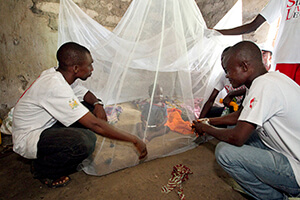
O Bispo Thomas J. Bickerton reservou um momento para liderar uma volta de vitória bem merecida para a campanha Imagine No Malária, observando que esta chegará ao fim em 2024.
Embora o programa em si esteja a terminar, o trabalho mais amplo dos Ministérios Globais na saúde global continuará.
Bickerton, presidente da comissão executiva do Imagine No Malária, classificou-o como “o último grande movimento na Igreja Metodista Unida”.
As receitas operacionais dos Ministérios Globais, UMCOR e da Junta de Ensino Superior e Ministério caíram 23,1 milhões de dólares de 2021 a 2022 (de 102,2 milhões de dólares para 79,1 milhões de dólares).
“Quase metade das nossas receitas para os Ministérios Globais provém dos deveres do Serviço Mundial (Fundo),” disse Michael Gurick, director financeiro dos Ministérios Globais e UMCOR. “E notarás uma tendência geral de declínio constante nos últimos quatro anos.”
De 2020 a 2023, as contribuições do Fundo de Serviço Mundial para os Ministérios Globais caíram de 22,3 milhões de dólares para 20,8 milhões de dólares.
E as coisas vão piorar antes de melhorarem.
“O impacto potencial da proposta de orçamento que (o Conselho Geral de Finanças e Administração) vai apresentar à Conferência Geral é tão significativo que vale a pena repetir,” disse Fernandes. “O CGFA recomenda uma redução drástica nas contribuições cobradas e, portanto, uma redução drástica no Fundo de Serviço Mundial, que é uma das principais fontes de financiamento para ambas nossas agências.”
O Conselho Geral de Finanças e Administração propõe reduzir a contribuição do Fundo de Serviço Mundial para os Ministérios Globais em 52%, disse ele. Isso reduziria a sua parcela de contribuição em mais de 60 milhões de dólares, “um enorme desafio para a agência sustentar,” disse ele.
“Seremos ajudados no curto prazo pelas decisões estratégicas que tomamos ao longo dos últimos cinco anos, que colocaram a agência numa boa posição financeira neste momento, com fortes reservas,” disse Fernandes. “Estas reservas significam que temos uma almofada que nos permitirá algum tempo de transição à medida que nos adaptamos à nova realidade orçamental.”
O fundo de reserva contém US$ 71 milhões, disse Gurick. A meta é que consiga cobrir entre seis e 12 meses de operação.
“Na verdade, estamos à frente disso, principalmente devido aos cortes e mudanças que ocorreram entre 2018 e 2020,” disse Gurick. “Fizemos esses cortes antecipando uma Conferência Geral que nunca aconteceu. Por esse motivo, pudemos ver a nossa posição de reserva crescer até onde estamos hoje. A UMCOR terminou com US$ 109 milhões em activos líquidos.”
Ainda assim, com os cortes previstos que se avizinham, “o tempo de transição será curto,” disse Fernandes.
“Há pressão para que se tomem acções decisivas nos próximos 18 meses para se ajustarem a estas novas realidades”, disse ele.
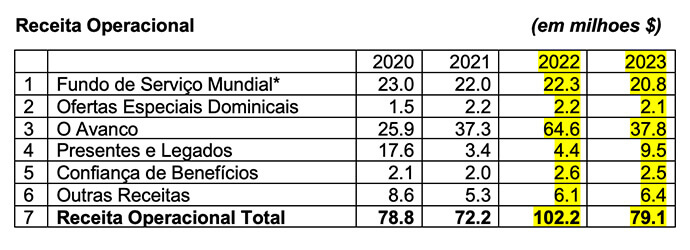
A angariação de fundos é mais importante do que nunca na sequência da perda de apoio denominacional, disse Fernandes.
“Acabamos de concluir um extenso estudo de angariação de fundos e em breve começaremos a trabalhar em algumas das recomendações do estudo, que a nossa comissão executiva tem vindo a analisar e apoiar,” disse Fernandes.
Gurick mencionou o que ele considera uma excelente oportunidade para arrecadar fundos.
“Recebemos coletivamente US$ 9,5 milhões… em 2023 de legados e presentes,” disse ele. “Em 2020, ano da pandemia, recebemos quase US$ 18 milhões. A maior parte disso não foi designada.” Não designado significa que não há condições sobre como o dinheiro é usado.
Isto indica a necessidade de falar sobre a missão dos Ministérios Globais com aqueles que estão se aposentando, disse Gurick. “Eles estão pensando em planificação imobiliária. Só acho que podes ver o impacto num ano, o que isso pode significar para nós.”
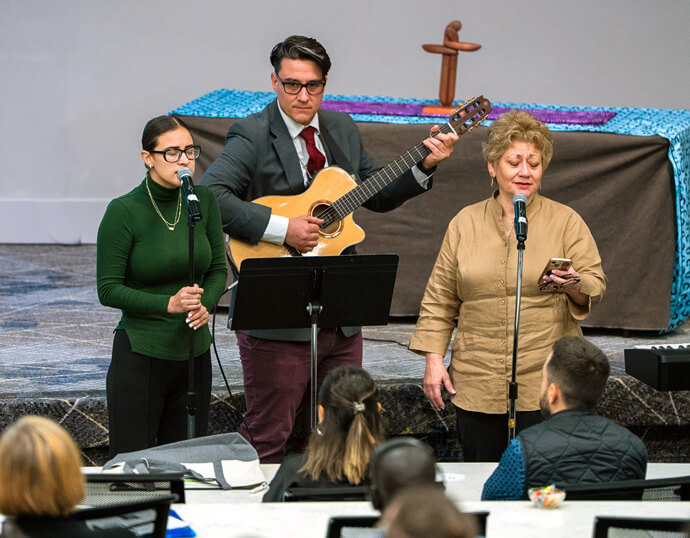
África Oriental
Para continuar o regresso da Área Episcopal da África Oriental ao rebanho dos Ministérios Globais, depois de uma década em que irregularidades financeiras fizeram com que lhe fosse negado apoio, Fernandes nomeará um assistente especial e um tesoureiro que se concentrará exclusivamente na área.
“Foi lamentável que tenha demorado mais de 10 anos a resolver esta questão, e ouvimos testemunhos preocupantes sobre os impactos negativos do embargo para a igreja na África Oriental,” disse Fernandes. “Há muito aprendizado com isso, e também havia muita esperança e expectativa sobre o que é possível para a igreja lá agora que o embargo acabou.
Assine a nossa nova newsletter eletrônica em espanhol e português UMCOMtigo
Você gosta do que está lendo e quer ver mais? Inscreva-se para receber nosso novo boletim eletrônico da UMCOMtigo, um resumo semanal em espanhol e português, com notícias, recursos e eventos importantes na vida da Igreja Metodista Unida
“Seremos muito intencionais no nosso trabalho na África Oriental para apoiar fortemente a igreja lá e restabelecer a parceria nas várias áreas programáticas dos Ministérios Globais.”
Esperança para o futurro
O Bispo Hee-Soo Jung, presidente do conselho dos Ministérios Globais desde 2016, disse que estava esperançoso com o futuro, apesar dos cortes orçamentais.
“Quando (pavimentas) um parque de estacionamento, mesmo que tenha pavimentado muito bem, ainda acontece uma rachadura,” disse ele. “Tem um dente-de-leão de flôr amarela saindo, certo?
“Essa é exactamente minha crença e teologia. Entre uma rachadura, sempre há uma nova vida surgindo.”
*Patterson é repórter das Noticias da MU em Nashville, Tennessee. Contacte-o pelo telefone 615-742-5470 ou newsdesk@umcom.org. Para ler mais notícias Metodistas Unidas, subscreva os Resumos Diários ou Semanais gratuitos.
**Sambo é correspondente Lusófono em África das Notícias da MU com sede em Maputo, Moçambique.

